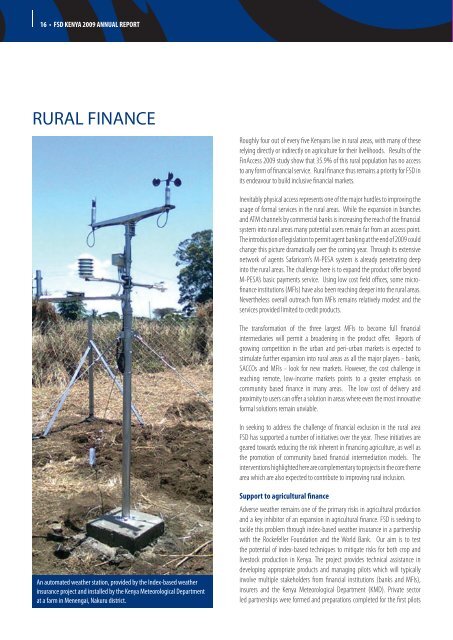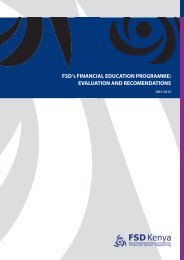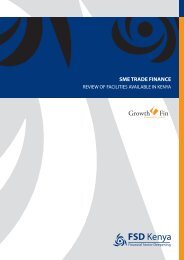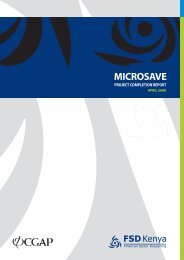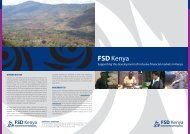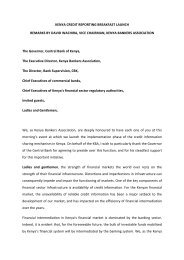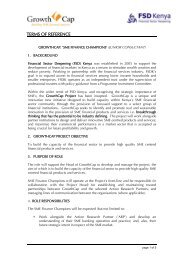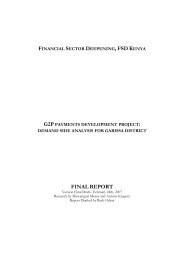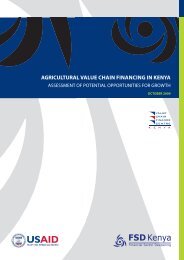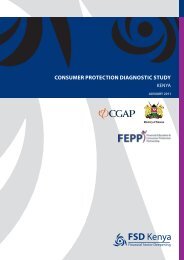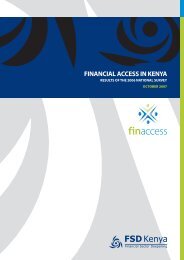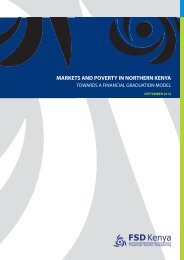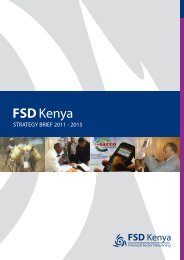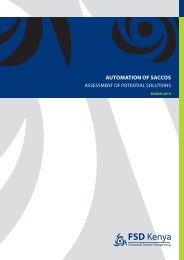2009 - FSD Kenya
2009 - FSD Kenya
2009 - FSD Kenya
Create successful ePaper yourself
Turn your PDF publications into a flip-book with our unique Google optimized e-Paper software.
16 • <strong>FSD</strong> KENYA <strong>2009</strong> ANNUAL REPORT<br />
rurAl FinAnCe<br />
An automated weather station, provided by the Index-based weather<br />
insurance project and installed by the <strong>Kenya</strong> Meteorological Department<br />
at a farm in Menengai, Nakuru district.<br />
Roughly four out of every five <strong>Kenya</strong>ns live in rural areas, with many of these<br />
relying directly or indirectly on agriculture for their livelihoods. Results of the<br />
FinAccess <strong>2009</strong> study show that 35.9% of this rural population has no access<br />
to any form of financial service. Rural finance thus remains a priority for <strong>FSD</strong> in<br />
its endeavour to build inclusive financial markets.<br />
Inevitably physical access represents one of the major hurdles to improving the<br />
usage of formal services in the rural areas. While the expansion in branches<br />
and ATM channels by commercial banks is increasing the reach of the financial<br />
system into rural areas many potential users remain far from an access point.<br />
The introduction of legislation to permit agent banking at the end of <strong>2009</strong> could<br />
change this picture dramatically over the coming year. Through its extensive<br />
network of agents Safaricom’s M-PESA system is already penetrating deep<br />
into the rural areas. The challenge here is to expand the product offer beyond<br />
M-PESA’s basic payments service. Using low cost field offices, some microfinance<br />
institutions (MFIs) have also been reaching deeper into the rural areas.<br />
Nevertheless overall outreach from MFIs remains relatively modest and the<br />
services provided limited to credit products.<br />
The transformation of the three largest MFIs to become full financial<br />
intermediaries will permit a broadening in the product offer. Reports of<br />
growing competition in the urban and peri-urban markets is expected to<br />
stimulate further expansion into rural areas as all the major players - banks,<br />
SACCOs and MFIs - look for new markets. However, the cost challenge in<br />
reaching remote, low-income markets points to a greater emphasis on<br />
community based finance in many areas. The low cost of delivery and<br />
proximity to users can offer a solution in areas where even the most innovative<br />
formal solutions remain unviable.<br />
In seeking to address the challenge of financial exclusion in the rural area<br />
<strong>FSD</strong> has supported a number of initiatives over the year. These initiatives are<br />
geared towards reducing the risk inherent in financing agriculture, as well as<br />
the promotion of community based financial intermediation models. The<br />
interventions highlighted here are complementary to projects in the core theme<br />
area which are also expected to contribute to improving rural inclusion.<br />
Support to agricultural finance<br />
Adverse weather remains one of the primary risks in agricultural production<br />
and a key inhibitor of an expansion in agricultural finance. <strong>FSD</strong> is seeking to<br />
tackle this problem through index-based weather insurance in a partnership<br />
with the Rockefeller Foundation and the World Bank. Our aim is to test<br />
the potential of index-based techniques to mitigate risks for both crop and<br />
livestock production in <strong>Kenya</strong>. The project provides technical assistance in<br />
developing appropriate products and managing pilots which will typically<br />
involve multiple stakeholders from financial institutions (banks and MFIs),<br />
insurers and the <strong>Kenya</strong> Meteorological Department (KMD). Private sector<br />
led partnerships were formed and preparations completed for the first pilots


